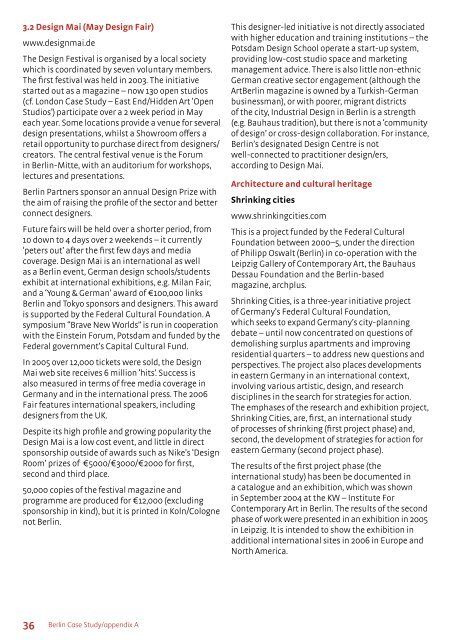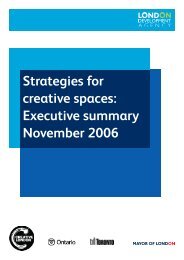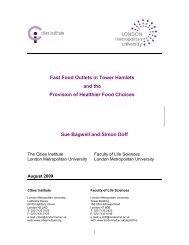Berlin Case Study - Cities Institute
Berlin Case Study - Cities Institute
Berlin Case Study - Cities Institute
You also want an ePaper? Increase the reach of your titles
YUMPU automatically turns print PDFs into web optimized ePapers that Google loves.
3.2 Design Mai (May Design Fair)<br />
www.designmai.de<br />
The Design Festival is organised by a local society<br />
which is coordinated by seven voluntary members.<br />
The first festival was held in 2003. The initiative<br />
started out as a magazine – now 130 open studios<br />
(cf. London <strong>Case</strong> <strong>Study</strong> – East End/Hidden Art ‘Open<br />
Studios’) participate over a 2 week period in May<br />
each year. Some locations provide a venue for several<br />
design presentations, whilst a Showroom offers a<br />
retail opportunity to purchase direct from designers/<br />
creators. The central festival venue is the Forum<br />
in <strong>Berlin</strong>-Mitte, with an auditorium for workshops,<br />
lectures and presentations.<br />
<strong>Berlin</strong> Partners sponsor an annual Design Prize with<br />
the aim of raising the profile of the sector and better<br />
connect designers.<br />
Future fairs will be held over a shorter period, from<br />
10 down to 4 days over 2 weekends – it currently<br />
‘peters out’ after the first few days and media<br />
coverage. Design Mai is an international as well<br />
as a <strong>Berlin</strong> event, German design schools/students<br />
exhibit at international exhibitions, e.g. Milan Fair,<br />
and a ‘Young & German’ award of €100,000 links<br />
<strong>Berlin</strong> and Tokyo sponsors and designers. This award<br />
is supported by the Federal Cultural Foundation. A<br />
symposium “Brave New Worlds” is run in cooperation<br />
with the Einstein Forum, Potsdam and funded by the<br />
Federal government’s Capital Cultural Fund.<br />
In 2005 over 12,000 tickets were sold, the Design<br />
Mai web site receives 6 million ‘hits’. Success is<br />
also measured in terms of free media coverage in<br />
Germany and in the international press. The 2006<br />
Fair features international speakers, including<br />
designers from the UK.<br />
Despite its high profile and growing popularity the<br />
Design Mai is a low cost event, and little in direct<br />
sponsorship outside of awards such as Nike’s ‘Design<br />
Room’ prizes of €5000/€3000/€2000 for first,<br />
second and third place.<br />
50,000 copies of the festival magazine and<br />
programme are produced for €12,000 (excluding<br />
sponsorship in kind), but it is printed in Koln/Cologne<br />
not <strong>Berlin</strong>.<br />
This designer-led initiative is not directly associated<br />
with higher education and training institutions – the<br />
Potsdam Design School operate a start-up system,<br />
providing low-cost studio space and marketing<br />
management advice. There is also little non-ethnic<br />
German creative sector engagement (although the<br />
Art<strong>Berlin</strong> magazine is owned by a Turkish-German<br />
businessman), or with poorer, migrant districts<br />
of the city, Industrial Design in <strong>Berlin</strong> is a strength<br />
(e.g. Bauhaus tradition), but there is not a ‘community<br />
of design’ or cross-design collaboration. For instance,<br />
<strong>Berlin</strong>’s designated Design Centre is not<br />
well-connected to practitioner design/ers,<br />
according to Design Mai.<br />
Architecture and cultural heritage<br />
Shrinking cities<br />
www.shrinkingcities.com<br />
This is a project funded by the Federal Cultural<br />
Foundation between 2000–5, under the direction<br />
of Philipp Oswalt (<strong>Berlin</strong>) in co-operation with the<br />
Leipzig Gallery of Contemporary Art, the Bauhaus<br />
Dessau Foundation and the <strong>Berlin</strong>-based<br />
magazine, archplus.<br />
Shrinking <strong>Cities</strong>, is a three-year initiative project<br />
of Germany’s Federal Cultural Foundation,<br />
which seeks to expand Germany’s city-planning<br />
debate – until now concentrated on questions of<br />
demolishing surplus apartments and improving<br />
residential quarters – to address new questions and<br />
perspectives. The project also places developments<br />
in eastern Germany in an international context,<br />
involving various artistic, design, and research<br />
disciplines in the search for strategies for action.<br />
The emphases of the research and exhibition project,<br />
Shrinking <strong>Cities</strong>, are, first, an international study<br />
of processes of shrinking (first project phase) and,<br />
second, the development of strategies for action for<br />
eastern Germany (second project phase).<br />
The results of the first project phase (the<br />
international study) has been be documented in<br />
a catalogue and an exhibition, which was shown<br />
in September 2004 at the KW – <strong>Institute</strong> For<br />
Contemporary Art in <strong>Berlin</strong>. The results of the second<br />
phase of work were presented in an exhibition in 2005<br />
in Leipzig. It is intended to show the exhibition in<br />
additional international sites in 2006 in Europe and<br />
North America.<br />
36<br />
<strong>Berlin</strong> <strong>Case</strong> <strong>Study</strong>/appendix A




